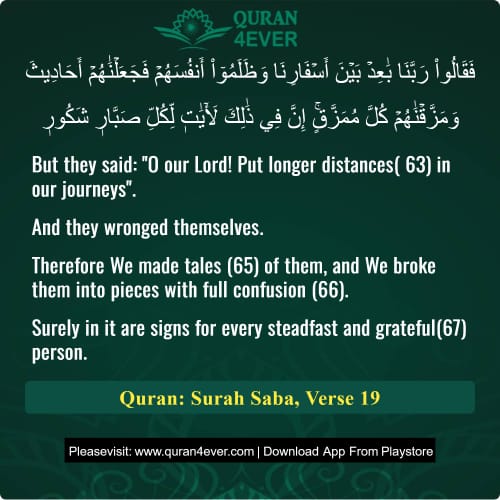
Transliteration:( Faqaaloo Rabbanaa baa'id baina asfaarinaa wa zalamooo anfusahum faja'alnaahum ahaadeesa wa mazzaq naahum kulla mumazzaq; inna fee zaalika la Aayaatil likulli sabbaarin shakoor )
"But they said: 'O our Lord! Put longer distances [63] in our journeys.' And they wronged themselves. Therefore We made tales [65] of them, and We broke them into pieces with full confusion [66]. Surely in it are signs for every steadfast and grateful [67] person."
Instead of appreciating the ease and convenience granted to them, the wealthy among the people of Saba complained, asking Allah to make their travel routes longer. Their reasoning was driven by arrogance and class pride—they desired to separate themselves from the poor who were enjoying the same travel luxuries. They wanted to carry servants and supplies to assert superiority. This ingratitude was a mark of their moral decline.
When a nation’s spiritual downfall begins, they lose the ability to ask wisely. Instead of seeking protection, gratitude, or righteousness, they begin to pray for things harmful to themselves. This verse reminds us to align our supplications with the wisdom of the Prophets and divine guidance, rather than personal ego or vanity.
Their downfall became legendary—so impactful that their story became a lesson passed on through generations. Allah turned them into a cautionary tale, so that future peoples might take heed and avoid repeating their mistakes. Their destruction was not only physical but also moral and cultural disintegration.
Their once unified and prosperous cities were scattered and ruined. Allah caused them to migrate in confusion—the tribe of Ghassaan settled in Syria, others went to Oman, Iraq, and some, like the ancestors of Aus and Khazraj, to Madinah. This dispersal shattered their strength and marked the end of their civilization’s coherence.
Though the lesson is universal, only those who are truly patient and thankful gain real insight from such histories. Sabr (patience) and shukr (gratitude) make the heart receptive to divine signs, enabling believers to reflect and correct their own lives before suffering a similar fate.
The tafsir of Surah Saba verse 19 by Ibn Kathir is unavailable here.
Please refer to Surah Saba ayat 18 which provides the complete commentary from verse 18 through 19.
(34:19) But they said: “Lord, make the stages of our journeys longer.”[32] They wronged their own selves so We reduced them to bygone tales, and utterly tore them to pieces.[33] Verily there are Signs in this for everyone who is steadfast and thankful.[34]
32. They may not have prayed thus in so many words. As a matter of fact, whoever is ungrateful to Allah for His blessings, tells Allah, as if to say that he is not worthy of those blessings. Likewise, the nation which abuses the bounties of Allah, in fact, prays to Him, as if to say, “Our Lord, withdraw Your blessings from us, we are not worthy of these.” Moreover, the words in the text also seem to suggest that the Sabaeans perhaps regarded their large population as a calamity for themselves, and they also wanted like the other foolish people that their population should fall.
33. That is, the people of Saba were so dispersed in all directions that their dispersion became proverbial. Even today when the Arabs have to mention the complete dispersion of any people they refer to the people of Saba as an example. When Allah caused His blessings to be withdrawn from them, the different tribes of the Sabaeans started leaving their homes and migrating to other parts of Arabia. The Banu Ghassan went to settle in Jordan and Syria, the Aus and Khazraj in Yathrib, and the Khuzaah in Tihamah near Jeddah. The Azd left for Uman and the Bani Lakhm and Judham and Kindah were also forced to give up their homes for other places. Thus, the Sabaeans ceased to exist as a nation and became a mere legend.
34. In this context the “steadfast and grateful” implies every such person (or persons) who does not lose his balance after he has received blessings from Allah, nor exults at prosperity, nor becomes heedless of God Who has blessed him with these. Such a person can learn great lessons from the history of those people who adopted the way of disobedience after attaining opportunities for progress and prosperity and ultimately met with their doom.
[1227]- Stories related to others as lessons or examples.

For a faster and smoother experience,
install our mobile app now.
Related Ayat(Verses)/Topics